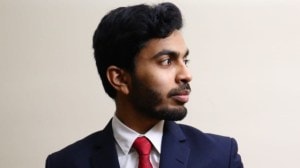The poetry of optimism, the triumph of political management
At the Invesco Field at Mile High, I asked The Nation magazine columnist and poet Katha Pollitt to tell me if there had been any moments of poetry at this Democratic convention.

At the Invesco Field at Mile High, I asked The Nation magazine columnist and poet Katha Pollitt to tell me if there had been any moments of poetry at this Democratic convention.
We were in the press box overlooking the rows filling-up with more than 75,000 Democratic faithful. On the Mitsubishi viewing screen in front of us, 96 feet by 27 feet, we could see the projected image of the speakers, mostly older white men, speaking in support of Barack Obama. Above the screen was the statue of a giant white bronco rearing in the air. Under the horse’s hooves were the tiny figures of two secret service agents standing with rifles and binoculars.
“There is poetry in Michelle Obama’s voice,” Pollitt said, “it’s very rich and powerful.” Pollitt felt that the woman who might be America’s next First Lady could be saying anything and it would sound good.
“It’s that beautiful contralto,” Pollitt explained.
There was also a lot of poetry, Pollitt felt, in the old refrain of family, home, and the nation. None of it had been very moving because it appeared that a lot of people were delivering the same message. The repetition was hardly surprising, because the Obama campaign has vetted each speech except for the truly brilliant one delivered by Bill Clinton.
Of course, the Democratic nominee has been widely noted for his lyrical gifts. In his memoir, in lines chosen almost at random, Obama writes about his reading the autobiography of Malcolm X: “His repeated acts of self-creation spoke to me; the blunt poetry of his words, his unadorned insistence on respect, promised a new and uncompromising order, martial in its discipline, forged through sheer of will.”
And yet, it is this gift for extraordinary eloquence that has also appeared a failing in Obama when people ask whether there is anything substantial behind the soaring rhetoric.
This might be one reason why Obama’s speech at Invesco Field presented, beneath the fluttering penants and sails, the ballast of policy statements. “As President, I will tap our natural gas reserves, invest in clean coal technology, and find ways to safely harness nuclear power… And I’ll invest $150 billion over the next decade in affordable, renewable sources of energy-wind power and solar power and the next generation of biofuels…”
Over the course of the Convention, I found that in the degraded landscape of television culture, poetry emerges only in the form of election slogans and put-downs. Weak alliteration and weak rhymes are especially prized. “Yes We Can. And Yes We Will.” “That’s not a maverick. That’s a sidekick.”
The prose that found biggest, and repeated, play was devoted to the mythology of the American dream. The loudest cheers were reserved for the moment when the speaker at the dais said, “You can be anything you want to be.” This was such a cherished thought, and so often repeated, that one would be justified in suspecting that Americans hold elections every four years only to convince themselves of the truth of this sentiment.
The truth, of course, is that one person, with a mix of talent and luck and shrewd strategy, has emerged a winner. When Obama took the stage at the Invesco Field, under the open twilight sky, a breeze stirring the flags on the ramparts of the stadium, he was speaking on the anniversary of the historic ‘I Have a Dream’ speech. And all the poetry and pathos that he expertly marshaled making his supporters forget that he didn’t get so far without sharp calculations and compromise.
This was true of the convention as a whole. In fact, I was stunned by the extent to which the campaign controlled access that the media had to people who had been involved in Obama’s campaign. There’s nothing particularly wrong in it; however, it would be wrong to assume that Obama’s achievement has been anything but a triumph of political management.
This can be put in another way. All the poetry of optimism, the breath of expectation, even the melancholy of small and big sufferings described by ordinary people — if all of this was poetry of a particular kind, then it had relied on the stolid prose of effort and careful organizing.
Shekar Narasimhan, an Indian American entrepreneur who is a part of the Finance Committee of the Democratic party, has worked on finding money for the party. He participated in a fund-raiser for Obama that raised a million dollars. Narasimhan told me that each day, as a campaigner for the party, he sends out fifty emails and engages in conference calls. Over the past few months, he has attended dozens of meetings.
There’s not only organization, there’s also prayer. Kamala Harris, the first Indian American to be elected District Attorney, told journalists that her grandmother in Chennai has been going to the temple every day to pray for Obama’s victory in November.
Journalist, author and academic Amitava Kumar
Photos





- 01
- 02
- 03
- 04
- 05


























